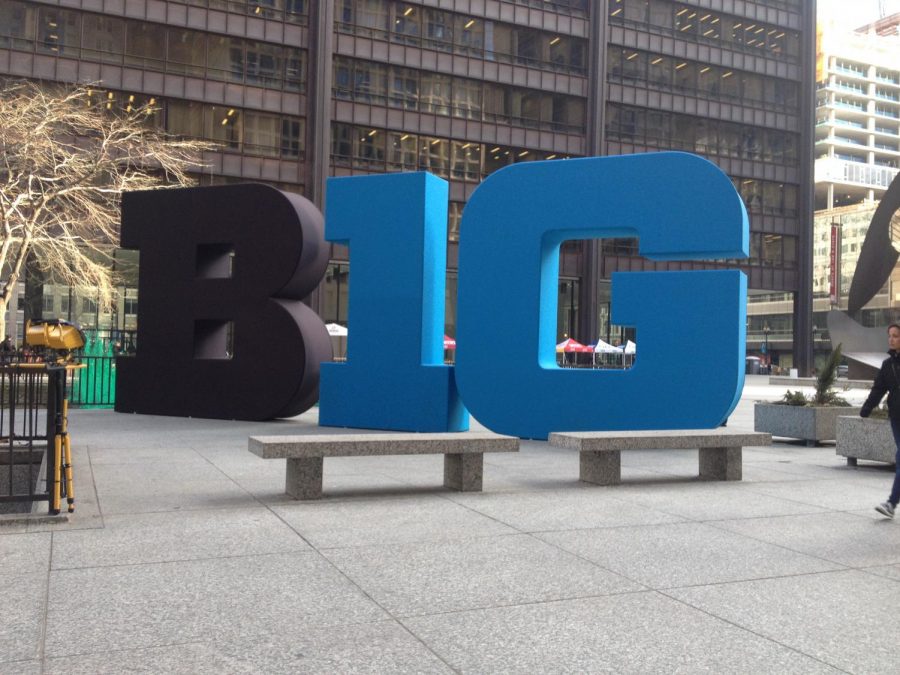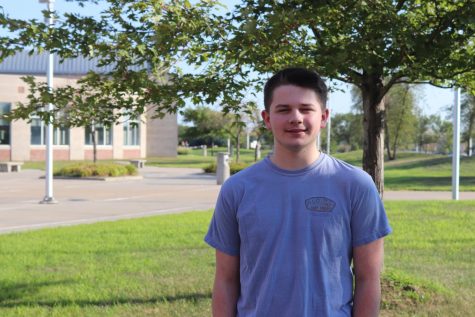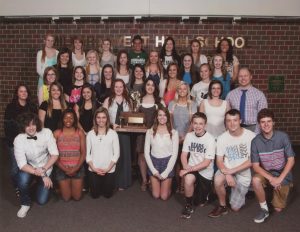A B1G decision
The Big Ten is under heavy scrutiny after tough choice to cancel football
The large Big Ten logo sits right outside the headquarters.
The same Big Ten cutout was surrounded by Big Ten parents just a few weeks ago in Rosemont, Illinois. The parents demanded to speak with commissioner Warren, and many of these parents are the same ones involved in the current, and young lawsuit.
September 11, 2020
The rumors swirling around the Big Ten’s decision making on college football have been all over the place. Everyone has reached a point where not even the coaches know what’s going on. It was quite a questionable and premature decision that might end up backfiring on the Big Ten, especially if the other conferences, pro leagues and high school football go on as planned.
A lot of high ranking officials have even chimed in, with President Donald Trump meeting with Big Ten commissioner Kevin Warren. It was an already divisive issue, and now it’s beginning to become a part of political conversations now.
Many have speculated that despite the 11-3 vote that decided to cancel the season, that there will be a new vote taken soon, and that the Big Ten could possibly even play in October. Yet, it all seems like smoke and mirrors. As the reports flooded out about a potential re-vote, then came the reports that the claims were false.
When asked at a press conference, Nebraska Athletic Director Bill Moos said “Those reports are news to me, we haven’t heard anything about a new vote.”
After reporting the initial news that there would be a re-vote, sports radio host Dan Patrick walked back, saying that the two Michigan teams, the two Illinois teams, Rutgers and Maryland would all have trouble getting past the state government in order to play. This has been a key reason why the PAC-12 has had really no outcry for a return to college football, as their entire conference is under too tough restrictions.
The three universities pushing the most for college football have been Ohio State, Nebraska and Iowa. One of the more confusing aspects has been activities like high school football going on normally in most of the states, with others like Iowa even having college football going on just down the interstate.
When commissioner Warren made the decision after the vote, he expected all the dominoes to fall into place and for every other conference to follow suit. The PAC-12 was the only conference to take the bait and join, while other conferences such as the Big Twelve, the ACC, and the SEC all releasing statements that they will play as planned, with some even having non conference dealings with each other.
A huge culprit in pulling off the smoke surrounding the Big Ten rumors is twitter user “Sir Yacht,” who amassed a small following from his sports podcast, and later used that following to put out misinformation surrounding the Big Ten, with tens of thousands of people believing his tweets, which he is still pushing weeks after his initial “reports.”
There were awful medical studies presented as well, with horrendous skewed data being presented as some of the key reasons for shutting down the season. A few weeks ago, a Penn State doctor released a study that he claimed 30-35% of Big ten athletes would get myocarditis, a heart condition, from contracting COVID-19. This made headlines all over platforms such as Bleacher Report and ESPN, but it was later retracted by the university itself, with the doctor claiming it was wrong. This retraction however, gained no large headlines from sports media.
Many of the parents of student-athletes are putting together a lawsuit against the Big Ten during the midst of all this, with a group of parents even protesting outside the Big Ten headquarters. These parents seem to be made up from the same three schools that voted to play, consisting of Hawkeye, Husker and Buckeye parents.
The truth is that almost no journalist, analyst, or even coach has any idea what is going to happen. It seems as if the decision making between the university presidents and the commissioner change on a dime, shown by Warren’s shyness towards answering questions or doing interviews, usually dancing around the questions asked. It’s truly sad that not only are the leaders proving to be horrific at doing just that, leading, but that we are even in this position of questioning sports six months after the beginning of the pandemic. One thing’s for certain however, and that’s that every college football fan wishes they were inside a stadium on Saturdays again.







